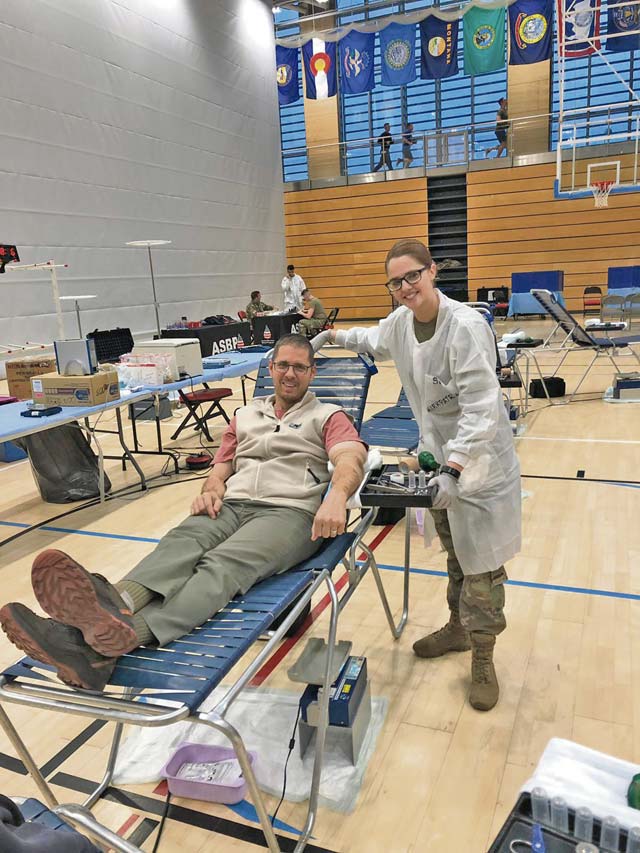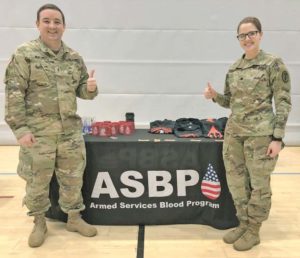
Without blood donors, there would be no blood products for people wounded in combat, fighting cancer, born prematurely or millions of other patients around the world.
“The only thing more important than blood products are the blood donors themselves,” said Lt. Col. Christopher Evans, Director of Joint Blood Operations at the Armed Services Blood Bank Center-Europe in Landstuhl. “Because blood products cannot be synthetically manufactured, blood drives are the only way of collecting the blood products people need.”
Blood products include red blood cells, platelets, plasma and whole blood.

“Most donors have no idea where their donations go or who they helped,” said Evans.
After the Blood Donor Center held a blood drive in Wiesbaden, Germany Nov. 20, 2018, the BDC team reached out to three donors to help them understand why their donations were so important. Bruce Holt, Chief Warrant Officer 2 Michael Murley and Spc. Anthony Colby learned that their blood helped trauma patients at Landstuhl Regional Medical Center.
The donors were surprised that they received any sort of notification of the use of their blood donation. The BCD team plans to continue contacting more donors in the future on a random basis.
“Getting a call was pretty confusing,” said Colby, a paralegal with the 66th Military Intelligence Brigade. “I wasn’t expecting a phone call, but it’s cool.”
Colby said that he donates because it helps the military as a whole and because his friends and coworkers either cannot or refuse to donate.
Unfortunately, the reluctance to donate has become a trend, Evans said. During National Blood Donor Month this January, Evans and the BDC team is thanking donors for their lifesaving contributions and encouraging others to roll up a sleeve and donate.
According to the American Red Cross, only 38 percent of the population is eligible to donate blood, and of that small group, only 10 percent actually donate.
“The reasons for this vary from fear of the process to bad experiences to feelings of indifference, as if their donations don’t really matter,” Evans said.
For Holt, a civilian contractor for U.S. Army Europe, a little advice for potential donors can go a long way.
“People at these blood drives know what they’re doing,” Holt said. “Instead of fearing the process, pray for the person that might receive the blood.”
He added that the incentives are nice, like t-shirts and glass mugs, but there is no need for it.
“Donating should be enough of a motivation for all, especially with how much of a difference it makes in surgeries and other life-saving procedures,” said Holt.
Evans emphasized that blood donors are the “single most crucial need in the medical field. Whether a person has donated blood one time or a hundred times, without them, there are no life-saving measures that can be performed.”
The Armed Services Blood Program collects from the military community, for the military community. Since 1962, the ASBP has been the sole producer of blood and blood products in the U.S. military.
For Murley, a warrant officer on the USAREUR intelligence staff, his motivation comes from his connection to the military community and knowing how easily blood can run out in hospitals, battalions, and aid stations. It is also the reason why he co-sponsors blood drives.
“It’s just not a friendly thought to have,” said Murley. “We are a small piece of the bigger picture, even though one wouldn’t think that donating would do that much.”
As the only Blood Donor Center located in Europe, the Armed Services Blood Bank Center-Europe keeps Landstuhl Regional Medical Center fully stocked with blood products for patients and also supports forward surgery teams in combat environments; combat theater hospitals; care during theater transfers; U.S. Navy ships; force service support groups; and allied and coalition hospitals throughout all of U.S. European Command and U.S. Africa Command.
About the Armed Services Blood Program
As a tri-service organization, the ASBP collects, processes, stores and distributes blood and blood products to Soldiers, Sailors, Airmen, Marines and their families worldwide. As one of four national blood collection organizations trusted to ensure the nation has a safe, potent blood supply, the ASBP works closely with our civilian counterparts by sharing donors on military installations where there are no military blood collection centers and by sharing blood products in times of need to maximize availability of this national treasure. To find out more about the ASBP or to schedule an appointment to donate, please visit www.militaryblood.dod.mil. To interact directly with ASBP staff members, see more photos or get the latest news, follow @militaryblood on Facebook, Twitter, Flickr, YouTube and Pinterest. If you have more questions give us a call at DSN: 314-590-5885 or 06371-9464-5885.







